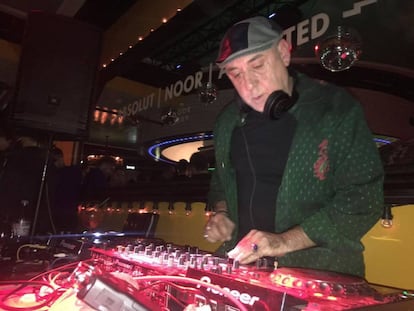José Padilla, legendary DJ who defined Ibiza’s chillout music scene, dies at age 64
The Barcelona-born producer, known for his Café del Mar compilations, was struggling financially when he lost his battle with colon cancer

Legendary Spanish DJ José Padilla, the creator of chillout music and an emblematic figure of the iconic Café del Mar club in Ibiza, died on Sunday from colon cancer. He was 64 years old. His death was announced on Tuesday in a message on his official Facebook fan page. “Now he has gone and the sunset in Ibiza will never be the same without him, but the beautiful music of José Padilla will stay with us forever,” it read.
Padilla was struggling financially when he was diagnosed with cancer. As a result of the coronavirus pandemic, the Barcelona-born producer had been out of work for five months, and on July 6, he shared the following message on Facebook: “Unfortunately I have some bad news. Some days ago I was taken to hospital and I have been diagnosed with colon cancer and now I am waiting for an operation. My situation is very bad, I am completely broken [sic] after five months with no income whatsoever and no way to pay my rent, so humbly I ask if you can help me with your donations.” Within 24 hours, he had raised €6,000. By the time the fundraiser ended 10 days later, Padilla had received €36,000. Some of the donations came from international famous DJs, such as British techno producer Carl Cox, who pitched in €500.
“He was a very endearing guy, he brought a lot of happiness with his music,” says Christian Len, a writer and DJ from Barcelona. “He was something of a legend in his style. People immediately responded to his fundraiser. And from all over the world." Len met with Padilla on several occasions – as recently as “three months ago,” he says. Many of these conversations will be published in the book Balearic. Historia Oral de la Cultura de Club en Ibiza 1950-2020 (or, Balearic. Oral History of Club Culture in Ibiza 1950-2020), which will be released on November 11.
José Padilla chilled a generation of clubbers and his art touched the lives of millions. He will always be remembered as the Godfather of Chillout, creator of Café del Mar compilations, and true Ibiza Legend. 🌅 pic.twitter.com/KRtMluYkQv
— Café del Mar (@CafedelMar_Ibz) October 19, 2020
Horacio Álvarez, a 37-year-old DJ from Granada who performs under the name Yawä Ze, worked as Padilla’s music assistant during the last years of his life. They also played together. Padilla’s death has hit him hard. “We were planning to take him home [from the hospital] and we were talking with some carers but there was no time,” he tells EL PAÍS. “He was a genius, the first person to put a soundtrack to a sunset.”
In a message on Twitter, Café del Mar wrote: “José chilled a generation of clubbers and his art touched the lives of millions. He will always be remembered as the godfather of chillout, creator of Café del Mar compilations, and true Ibiza legend.” British DJ and festival promoter Rob Da Bank also shared: “José made me cry with a beautifully synced sunset... he made so many moments like that for people.”
Padilla moved from his native Catalonia to Ibiza in 1976, where he worked as a DJ in various bars and restaurants on the Balearic island. In the 1980s, he began selling mixtapes of his music in small markets before becoming the resident DJ of Café del Mar, an iconic establishment overlooking San Antonio beach, known for its sunsets and the chillout music created by Padilla. “He did not invent the term chillout,” says Len. “It was someone from an English outlet who was the first to use it after listening to Padilla’s music.”
He was a genius, the first person to put a soundtrack to a sunsetChristian Len, writer and DJ from Barcelona
Padilla put a soundtrack to something as visual and evocative as a sunset. “That is his great legacy. He invented it. It touched our hearts,” says Len. From the mid-1990s, Padilla’s music began to be sold on Café del Mar compilations. Years later, the musician would take the brand to court over economic disputes. “That wore him out a lot, it even led to depression in the last years of his life,” say his close relatives.
Padilla was a charming character but unable to manage the money side of the music business. Budgets were never his strong point. The chillout music trend ended in the 1990s with clubbers in Ibiza preferring to watch the sunset while dancing, not lying down. Padilla had to adapt to the new tastes, always maintaining the aura of a pioneer and respected musician.
The producer used to complain that his music was poorly valued in Spain, while he continued to be in high demand in Japan, Bali and the United States. Last New Year’s Eve, he performed in Bangkok. But in recent years, most of the money he earned went to pay off his large debt with the Spanish tax office. Padilla lived from day to day without any problems until the coronavirus pandemic hit the world and he was forced to cancel all his gigs.
Padilla leaves behind hundreds of mixtapes that he created over the years and kept in his apartment in Ibiza. Since the 1980s, the DJ had recorded all of his sessions on cassette, including those he did with other international figures such as Andy Weatherall, David Holmes, Tom Middleton, Andy Wilson and Chris Coco. These sessions were recorded in legendary Ibiza clubs such as Pachá, Space, Hostal La Torre and Café del Mar, and will be shared online in the next few weeks. And in 2021, a label named Balearic Resistance, founded by Horacio Álvarez, Anil Lal and Padilla himself, will begin to publish the music of artists from lots of different styles. Padilla’s legacy will live on long after the sunset.
English version by Melissa Kitson.
Tu suscripción se está usando en otro dispositivo
¿Quieres añadir otro usuario a tu suscripción?
Si continúas leyendo en este dispositivo, no se podrá leer en el otro.
FlechaTu suscripción se está usando en otro dispositivo y solo puedes acceder a EL PAÍS desde un dispositivo a la vez.
Si quieres compartir tu cuenta, cambia tu suscripción a la modalidad Premium, así podrás añadir otro usuario. Cada uno accederá con su propia cuenta de email, lo que os permitirá personalizar vuestra experiencia en EL PAÍS.
¿Tienes una suscripción de empresa? Accede aquí para contratar más cuentas.
En el caso de no saber quién está usando tu cuenta, te recomendamos cambiar tu contraseña aquí.
Si decides continuar compartiendo tu cuenta, este mensaje se mostrará en tu dispositivo y en el de la otra persona que está usando tu cuenta de forma indefinida, afectando a tu experiencia de lectura. Puedes consultar aquí los términos y condiciones de la suscripción digital.









































